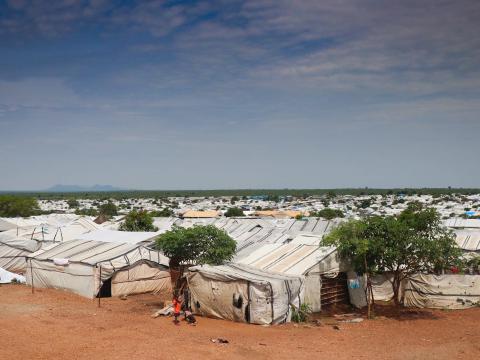All hands on deck: South Sudan’s crisis requires doing humanitarian work differently

By Dr. Mesfin Loha, Country Director, World Vision South Sudan
We recently visited Tonj South County in Warrap State, where World Vision and Comitato Collaborazione Medica (CCM) launched an emergency response project funded by the South Sudan Humanitarian Fund (SSHF) as part of its “response scale up” initiative.
The emergency response is very timely with the release of the Integrated Food Security Phase Classification (IPC) results in December 2020 where the greater Tonj area that covers the three counties of Tonj East, North, and South, was found with the most severe levels of food insecurity.
The IPC report further projects that between April to July 2021, “an estimated 7.24 million people (60% of the population) are likely to face a crisis or worse acute food insecurity”, with 31,000 people likely to be in catastrophe, which include 13,000 people in Tonj North County.
This project is complemented by the many ongoing programs World Vision and other partners that hopefully will help prevent further deterioration of the situation and contribute to the much-needed recovery.
The situation, however, is dire for millions of people in the whole country. These numbers include children, mothers, the elderly, and those with special needs. The call for urgency is being sounded to avoid the catastrophe.
The risks are high as the needs are so multifaceted and deep-rooted. The weak social service delivery systems and underdeveloped infrastructures present a mammoth task that requires unprecedented levels of coordination and collaboration.
We must pick up the pace ahead of the rainy season that results in serious flooding, thus hampers humanitarian movement and access. The situation in South Sudan deserves a response like no other.
Collaboration and convergence will also create platforms and pave ways to enhance recovery and resilience, taking initiatives beyond single projects. We have to work together to be able to rescue the people from this looming hunger crisis in the face of the pandemic.
The Tonj counties, just like the many parts of the country, are ravaged by inter-communal conflicts. Any meaningful intervention meant to bring about long-term benefits to people must navigate across the humanitarian-development and peace nexus, in practical ways.
Local peace-building efforts must be embedded in all interventions, including mobilization of faith actors, local leaders, and gatekeepers. The current heightened focus on averting severe food insecurity could be an opportunity to do humanitarian work differently, with a little more rethinking so that we do not find ourselves in the same situation time and again, as in the present case.
The crisis, coupled with the funding challenges, will also detrimentally impact the work that we do in Malakal, a part of Upper Nile State, where World Vision and the World Food Programme (WFP) support close to 30,000 internally-displaced in the Protection of Civilians (PoC) camp.
The desire of hardworking South Sudanese people in the internally-displaced camps is to go home and start working in their farms to support their families. But with the communal clashes and lack of infrastructures, they are forced to live a life of dependency.
We must pick up the pace ahead of the rainy season that results in serious flooding, thus hampers humanitarian movement and access. The situation in South Sudan deserves a response like no other.
It must be one with courage, hope, and determination that all actors must commit to in tackling the challenge, as we are stronger together.
Watch our COVID-19 Emergency Response One Year On in South Sudan
Cover photo: The Malakal Protection of Civilians (PoC) site in Upper Nile State, with close to 30,000 internally displaced people. Photo by Scovia Faida Charles Duku, Communications Coordinator.